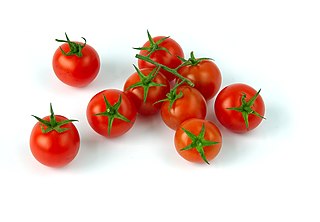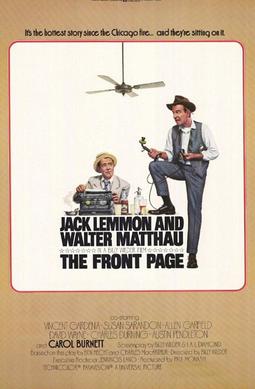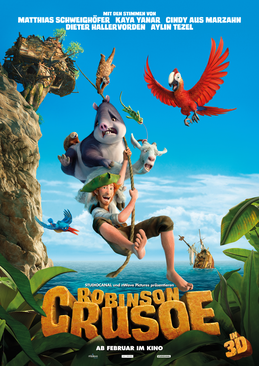Wild Tomato may refer to:
- Wild tomato, a group of plants and their fruit of genus Lycopersicon
- WildTomato , a lifestyle magazine in New Zealand
Wild Tomato may refer to:

Tomato sauce can refer to many different sauces made primarily from tomatoes, usually to be served as part of a dish, rather than as a condiment. Tomato sauces are common for meat and vegetables, but they are perhaps best known as bases for sauces for Mexican salsas and Italian pasta dishes. Tomatoes have a rich flavor, high water content, soft flesh which breaks down easily, and the right composition to thicken into a sauce when stewed without the need for thickeners such as roux or masa. All of these qualities make them ideal for simple and appealing sauces.

Wild Strawberries is a 1957 Swedish drama film written and directed by Ingmar Bergman. The original Swedish title is Smultronstället, which literally means "the wild strawberry patch" but idiomatically signifies a hidden gem of a place, often with personal or sentimental value, and not widely known. The cast includes Victor Sjöström in his final screen performance as an old man recalling his past, as well as Bergman regulars Bibi Andersson, Ingrid Thulin, and Gunnar Björnstrand. Max von Sydow also appears in a small role.

Pico de gallo, also called salsa fresca, salsa bandera, and salsa cruda, is a type of salsa commonly used in Mexican cuisine. It is traditionally made from chopped tomato, onion, and serrano peppers, with salt, lime juice, and cilantro.

Studio Ghibli, Inc. is a Japanese animation studio based in Koganei, Tokyo. It has a strong presence in the animation industry and has expanded its portfolio to include various media formats, such as short subjects, television commercials, and two television films. Their work has been well-received by audiences and recognized with numerous awards. Their mascot and most recognizable symbol, the character Totoro from the 1988 film My Neighbor Totoro, is a giant spirit inspired by raccoon dogs (tanuki) and cats (neko). Among the studio's highest-grossing films are Spirited Away (2001), Howl's Moving Castle (2004), and Ponyo (2008). Studio Ghibli was founded on June 15, 1985, by the directors Hayao Miyazaki and Isao Takahata and producer Toshio Suzuki, after acquiring Topcraft's assets. The studio has also collaborated with video game studios on the visual development of several games.

Wild Things is a 1998 American neo-noir erotic thriller film directed by John McNaughton and starring Matt Dillon, Kevin Bacon, Neve Campbell, Denise Richards, Theresa Russell, Robert Wagner, and Bill Murray. It follows a high school guidance counselor in south Florida who is accused of rape by two female students and a series of subsequent revelations after a police officer begins investigating the alleged crimes.

Gene Wilder was an American actor, comedian, writer and filmmaker known mainly for his comedic roles, but also for his portrayal of Willy Wonka in Willy Wonka & the Chocolate Factory (1971). He collaborated with Mel Brooks on the films The Producers (1967), Blazing Saddles (1974) and Young Frankenstein (1974), and with Richard Pryor in the films Silver Streak (1976), Stir Crazy (1980), See No Evil, Hear No Evil (1989) and Another You (1991).

Raymond Allen Liotta was an American actor. He first gained attention for his role in the film Something Wild (1986), which earned him a Golden Globe Award nomination. He was best known for his portrayals of Shoeless Joe Jackson in the film Field of Dreams (1989) and Henry Hill in the film Goodfellas (1990). Liotta appeared in numerous other films, including Unlawful Entry (1992), Cop Land (1997), Hannibal (2001), Blow (2001), John Q. (2002), Identity (2003), Killing Them Softly (2012), The Place Beyond the Pines (2012), and Marriage Story (2019).
Currant may refer to:

The Seven Year Itch is a 1955 American romantic comedy film directed by Billy Wilder, from a screenplay he co-wrote with George Axelrod from the 1952 three-act play. The film stars Marilyn Monroe and Tom Ewell, who reprised his stage role. It contains one of the most iconic pop-culture images of the 20th century – Monroe standing on a subway grate as her white dress is blown upwards by a passing train. The titular phrase, which refers to a waning interest in monogamous relationship after seven years of marriage, has been used by psychologists.

Rotten Tomatoes is an American review-aggregation website for film and television. The company was launched in August 1998 by three undergraduate students at the University of California, Berkeley: Senh Duong, Patrick Y. Lee, and Stephen Wang. Although the name "Rotten Tomatoes" connects to the practice of audiences throwing rotten tomatoes in disapproval of a poor stage performance, the direct inspiration for the name from Duong, Lee, and Wang came from an equivalent scene in the 1992 Canadian film Léolo.

The cherry tomato is a type of small round tomato believed to be an intermediate genetic admixture between wild currant-type tomatoes and domesticated garden tomatoes. Cherry tomatoes range in size from a thumbtip up to the size of a golf ball, and can range from spherical to slightly oblong in shape. Although usually red, other colours such as orange, yellow, green, purple, and black also exist. Those shaped like an oblong share characteristics with plum tomatoes and are known as grape tomatoes. The cherry tomato is regarded as a botanical variety of the cultivated berry, Solanum lycopersicum var. cerasiforme.

Wild Rovers is a 1971 American Western film directed by Blake Edwards and starring William Holden and Ryan O'Neal.

The Front Page is a 1974 American black comedy-drama film directed by Billy Wilder, and starring Jack Lemmon and Walter Matthau. The screenplay by Wilder and I.A.L. Diamond is based on Ben Hecht and Charles MacArthur's 1928 play of the same name, which inspired several other films, such as the 1931 film "The Front Page," the 1940 comedy film "His Girl Friday," and televised movies and series episodes.

The tomato is the edible berry of the plant Solanum lycopersicum, commonly known as the tomato plant. The species originated in western South America, Mexico, and Central America. The Nahuatl word tomatl gave rise to the Spanish word tomate, from which the English word tomato derives. Its domestication and use as a cultivated food may have originated with the indigenous peoples of Mexico. The Aztecs used tomatoes in their cooking at the time of the Spanish conquest of the Aztec Empire, and after the Spanish encountered the tomato for the first time after their contact with the Aztecs, they brought the plant to Europe, in a widespread transfer of plants known as the Columbian exchange. From there, the tomato was introduced to other parts of the European-colonized world during the 16th century.
A pimp is someone who finds and manages clients for prostitutes and engages them in prostitution in order to profit from their earnings.

Gabonese cuisine is the cooking traditions, practices, foods and dishes associated with Gabon, a sovereign state on the west coast of Central Africa. French cuisine is prevalent as a notable influence, and in larger cities various French specialties are available. In rural areas, food staples, such as cassava, rice and yams, are commonly used.

Tomaccio tomatoes resulted from a 12-year breeding program using a wild Peruvian tomato species. The program was developed by Hishtil in Israel. Tomaccio is a vigorous, high yielding, early fruiting cherry tomato bred primarily for the sun-dried tomato market.

Pasta con le sarde is a Sicilian dish of pasta with sardines and anchovies. It is recognized as a traditional Italian food product in the prodotto agroalimentare tradizionale scheme of the Italian government. It is most associated with Sicily's capital Palermo, but it can be found all over the island.

Robinson Crusoe is a 2016 Belgian-French 3D animated adventure comedy film directed by Vincent Kesteloot and Ben Stassen and written by Lee Christopher, Domonic Paris and Graham Weldon. The film is loosely based on the 1719 novel Robinson Crusoe by Daniel Defoe, but from the point of view of the island's animals. The film was released in the United States on September 9, 2016. Despite receiving negative reviews from the critics and earning a 17% approval rating on Rotten Tomatoes, Robinson Crusoe was a moderate box office success, grossing $39.5 million worldwide against a budget of $13 million.

Wild Wild Country is a Netflix documentary series about the controversial Indian guru Bhagwan Shree Rajneesh (Osho), his one-time personal assistant Ma Anand Sheela, and their community of followers in the Rajneeshpuram community located in Wasco County, Oregon, US. It was released on Netflix on March 16, 2018, after premiering at the Sundance Film Festival. The title of the series is drawn from the Bill Callahan song "Drover", which features prominently in the final episode, and it also echoes the comments of Jane Stork about first seeing the ranch, shown at the beginning of episode 2: "it was just so wild, so rugged, but vast—really wild country".